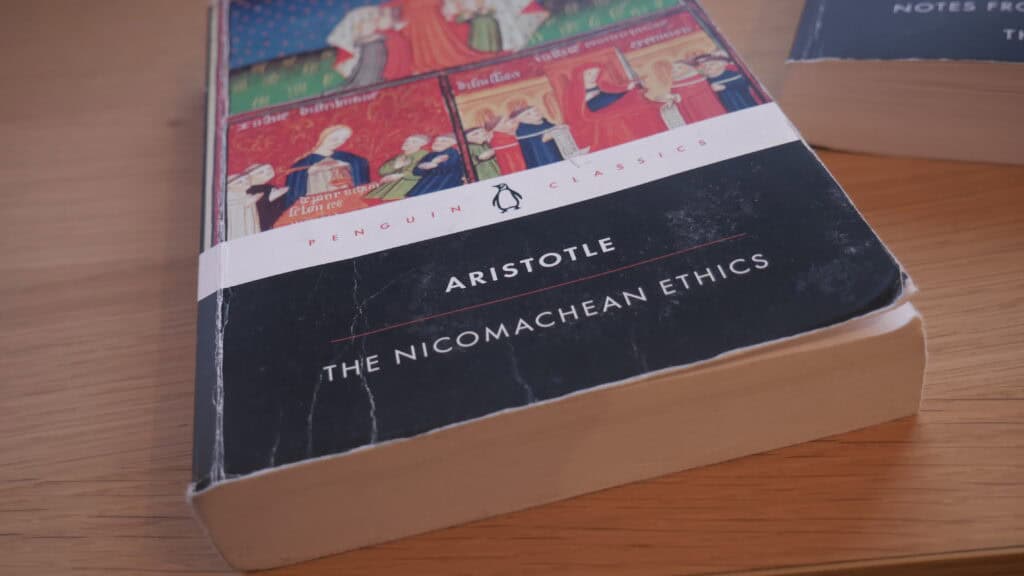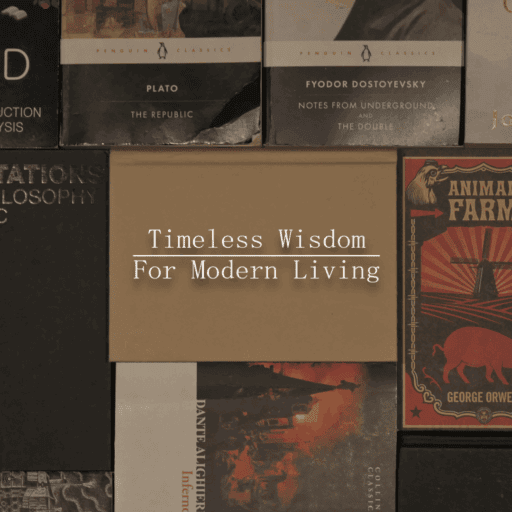
Arete is another key principle in Greek Philosophy. It means “excellence”, and it’s crucial to know if you want to improve yourself. Read more about it here: What is Arete? – Greek Philosophy
The Four Cardinal Virtues go hand-in-hand with human excellence. Learn about what they are, and how to adopt them into your life here: What are the Four Cardinal Virtues? – Greek Philosophy
How can we use Aristotle’s teachings to develop the best character? Read here: Aristotle’s Virtue Ethics – How To Make The Right Decisions
Finding Moderation in a World of Extremes
Hustle culture. We must work harder than everyone else and use up every minute we have doing something “productive”. The intentions behind self-improvement or “monk-mode” posts are rooted in goodness, but they still pose a problem. People compare themselves to perfection; such a comparison will always lead to dismay and upset. Nobody is perfect so we shouldn’t try to be. As a result we always try to do the extremes; working 24/7, always relying on caffeine and sleeping for 5 hours every night. Where is the balance? Where is the moderation?
How do we actually work hard in relation to our own true capabilities, and not by the standards set by others?
Moderation is hard to come by in todays world. Think back to your school days and it was probably very likely that your teachers told you that x or y amount of studying was the bare minimum (ranging anywhere from 2-8 hours a day). We are setting exceedingly high, unrealistic expectations for ourselves and others. The deceitful nature of social media is drilling false ideals into our minds. We are lacking knowledge as to how our own unique brains work best.
“We are what we repeatedly do. Excellence, then, is not an act, but a habit.” – Aristotle
Moderation is a skill that can be learned through action. Aristotle said that virtue can be learned through education and habit. This is the basis upon which all meaningful skills are built.
To Aristotle, excellence was habit.
Most Standards aren’t Real
We all compare ourselves to appearances. Everything you see online has been purposefully constructed. We compare ourselves and our standards to what we think other people do. Extremes are the new standard.
How do we drift away from extremes and find the point of moderation, unique to the context and circumstances of our own individual lives?
always chasing the extremes
We seem to have this ‘grind-set’ mentality where we should be working hard for every waking minute of the day. Working too hard and pushing beyond our limits only to burn ourselves out and get stuck.
“Physical excellence does not of itself produce a good mind and character: on the other hand, excellence of mind and character will make the best of the physique it is given.” – Plato
The mind and body must be trained appropriately; one must not be neglected for the sole pursuit of developing the other. But training is a marathon, not a sprint. It takes years to read and understand the greatest works of literature. You cannot deadlift three times your bodyweight in a month if you are untrained. Everything takes a long time.
In the search for greatness, we inevitably seek shortcuts. Fad diets don’t work; going cold turkey on our personal vices is a very drastic change that has a low probability of helping you in the long term. The extreme choice always seems like the quickest and most efficient one; this is a sure-fire way to become apathetic and burnt out very quickly.
Not all personal vices need to disappear completely. It’s very hard to do such a thing. Social media has an awful lot of cons, but also has its place in social life. Moderation can be found with things that we often wish we could avoid. You have to negotiate with yourself on how to gain control.
Constantly comparing yourself to a perfect ideal, choosing the most extreme choices in the hopes of reaching success fast. Living a life of extremity is unharmonious to the soul.
Plato believed that the greatest individual and city was one built on harmony; all elements should be supporting another whilst being subordinate to reason. This is the underlying structure that moderation provides.
The Solution: Aristotle’s Golden Mean
aristotle and his Philosophy
“Moderation in all things is best.” – Aristotle
Aristotle defined virtue as a mean point between excess and deficiency (both of which are vices). Moderation is achieved by finding the balanced point between two extremes.
For example, courage is a virtue that lies somewhere between recklessness (excess) and cowardice (deficiency).
Aristotle said that virtue is a hard target to define and an easy one to miss. There is no concrete guide in regards to defining perfect conduct, for we must always consider the context of every situation; the details matter. Aristotle encourages a general outlook when regarding ethics, and to not get bogged down in trying to be perfect. If we at least get close to the perfect ideal, we’ll still be successful but in a sustainable way.
Read more about the search for absolute perfection at: How ‘The Problems of Philosophy’ Can Improve Your Life
applying this to moderation
“The beginning seems to be more than half of the whole.” – Aristotle
Moderation is all about finding the sweet spot. Not too much and not too little. This will allow you to live a life of harmony. You’ll be able to live a life of sustainability and consistency today, tomorrow and for the rest of your life if the balance is right. Moderation is a unique definition that differs from person to person. Every persons needs and abilities are unique, and the moderate life should take this into account.
You can apply the concept of the Golden Mean to all aspects of your life. How much hard, intense physical or intellectual work can you actually do in a day or week? How much social interaction can you handle before your battery dies? Can you have all of your meals be healthy at least 80% of the time? How about 70%, or even 50%? You have to negotiate with yourself honestly and truthfully. How much work can you truly tolerate and stick to consistently over the next few days or weeks at least?
why it works
“Excessive fear or excessive confidence can equally lead us to mistakes.” – Plato
The Golden Mean allows for flexibility—it’s not about following rigid ruleset, but finding what works for you and your current levels of ability.
The beauty of Aristotle’s ethical philosophy is that it’s broad; it’s more of a guideline than a code. It always takes the context and circumstances into account.
The Golden Mean aligns with human nature. Homeostasis is a biological process; compensation is a psychological process; seeking equilibrium is a human process. We need it in order to sustain our efforts across the entire life cycle.
How To Go About Finding Moderation
“Nothing can bring you peace but yourself. Nothing can bring you peace but the triumph of principles.” – Ralph Waldo Emerson
What are the practical steps on how to apply Aristotle’s Golden Mean to your own life in the search for balance?
Step 1: Self-awareness
This means completely dissolving your ego and whatever self-images you have of yourself. You need to analyze the key areas in your life and see where you are leaning towards the extremes, either excess or deficiency. Ask yourself this: where am I doing too much and too little?
Step 2: Define the Extremes
Think about clearly defining the two extremes, excess and deficiency, within each area of your life.
Work: unemployed vs 70+ hour work weeks.
Relationships: zero contact with anyone bar yourself vs constant face to face talking for every minute of every day.
Health: no training plan vs 10+ sessions a week.
These are only rough examples and the extremes seem quite preposterous compared to most peoples lives. But they help you in defining your own version of what is an excess or a deficiency to you. Not having a reading habit might be considered a deficiency to most people. But maybe reading for 20 minutes a day is too excessive for you. Maybe 10 minutes a day is something you could actually sustain instead. This is what this step is all about. This is where you find out your own thresholds of tolerance.
Step 3: Find the Middle Ground
Once you’ve defined your two extremes, you need to find your point of sustainability. You don’t want to be pushing to or beyond your limits every day; this will lead to burnout. 80% effort sustained over a year will lead to much more work being done than by going 120% for three weeks.
Find your limit then fall back a bit; this is how you can sustain a high effort over a very long period of time and get more done. Working close to your limit may not be your absolute best, but it’s not nothing either.
Step 4: Practice and Reassess
Don’t try to make too many changes at once. Start by implementing one change every week or so. You might think that you are capable of doing more, but remember: your life is already unbalanced, so why do you think you can handle more to begin with? Improvements are still improvements no matter how small. Start off with one change and stick to it. You need consistency before you start adding more weight. If you can’t keep consistent, there is no point in adding more stress because you’re already doing too much.
Reflect and reassess your limits every week. Did you hit your goals? Could you have done a little bit more or less (whilst always keeping the long term in mind)? Keep making little changes here and there in relation to your needs and limits.
Life needs some degree of flexibility and consistent fine-tuning.
Step 5: Cultivate Patience and Self-Compassion
Over time, you’ll be able to find balance with all of the responsibilities and goals that you’re trying to juggle. Go easy ant the start and aim low. A low aim must be accessible and achievable for you. Don’t listen to other people’s standards. It’s all about what you yourself are capable of.
Be kind to yourself, and always remember that done is better than perfect because perfect can never be done.
Every obstacle is an opportunity for learning something new about yourself and your limits. Over time, your limits will increase and you will be able to take on more.
Conclusion
Moderation is a necessity if we’re to thrive across multiple areas of life. A jack of all trades is a master of none; that doesn’t mean you can’t get pretty damn good at a lot of skills. You might never become a world champion, but you can get pretty close.
True balance comes from knowing your own limits; what you are capable of in any given day. Its all about understanding yourself and setting yourself up for consistent, long term success.
You’re steering your own ship. You’d might as well go to understand all of its intricacies, flaws and limits. You’re on this ship for life so gain as much control of it as you can.
What is one area of your life that you want to improve on? What areas of your life need to be re-evaluated and changed? In what areas are you doing too much? In what areas are you doing too little?
Check out similar posts here: https://timelesswisdomformodernliving.com
Follow us on X for more wisdom: https://x.com/twfml
